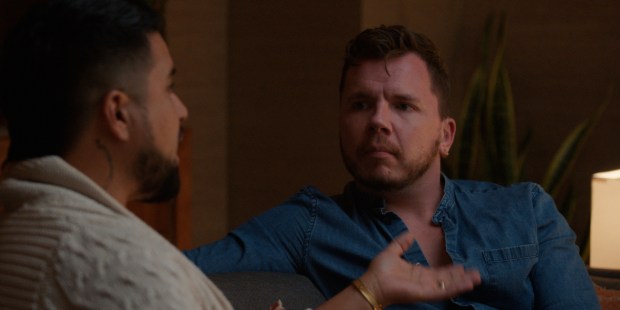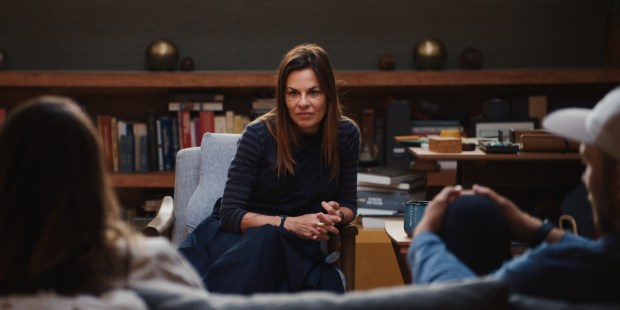Someone was recently telling me about a vacation they took with their partner, and when they mentioned some moments of friction that came up, my mind immediately went to “Couples Therapy.” Everyone experiences conflict in life, even with those closest to you, and it can be tricky to work through that. But the show’s psychoanalyst Orna Guralnik is wonderfully perceptive when it comes to helping people talk about what’s really going on.
The unscripted series returns on Showtime for the second half of Season 4, which premiered last year. Featuring all new couples, it’s functionally a new season. (I’m unclear why Showtime makes this confusing distinction, but if I were to guess, it’s related to money and maybe results in a cheaper deal on the network’s end.)
Sometimes people just aren’t compatible. But in many cases, the bickering and fights in these relationships are about something deeper. Picking at one another endlessly or obsessing over something that doesn’t really matter is a way to fill the space between two people who are trying to make some kind of connection, Guralnik says. But it’s all noise and you’re “nowhere real.” The reason analysts might be able to help is that they are trained to “listen for that and to find a way to move from noise to signal.”
Four couples are featured. Rod and Alison have been married for nearly 20 years and they have a dynamic we’ve seen on the series before: She comes across as a harpy, whereas he is passive-aggressive and then retreats into himself. At one point, the energy feels so contentious that Guralnik stops to ask: Are you fighting right now? No, you’ll know when that happens, Alison tells her. To which Guralnik says: “I’m just curious about the tone.” Alison doesn’t deny it: “Oh, I have a tone.” I couldn’t help but laugh because Alison is brusque and abrasive — at least she’s self-aware! “This is how it’s always been,” she says of her marriage. “We have no patience for each other.”
Another couple, Boris and Jessica, have been together about half as long, but the tension between them is just as intense. They’ve recently relocated to New York City. She is thriving, but he hates everything about their new life, even though they’ve finally achieved some stability. “We are just aliens to each other,” he tells Guralnik.
(Boris is the novelist Boris Fishman, and this raises some questions about when the season was filmed; according to his Wikipedia page, in 2024 he began teaching at the University of Austin “where he lives with his wife and daughter.” Presumably they moved. Presumably they are still together. This is important, considering where they live is a primary source of discord between them.)
Kyle and Mondo have been together for six years. The former is deaf and immigrated to the U.S. from Poland as a child. Sometimes he feels smothered by his partner. At other times, because of his disability, he feels left out of things or prefers to spend time with his deaf friends. Kyle also wants an open relationship and Mondo is unenthusiastic about this, while also dealing with other issues, including grief for a mother who died from COVID. Despite their problems, they come across as the couple who seem to have most retained the feelings of affection that first drew them together.

Finally, there’s Nick and Katherine. “We’re on our own islands,” one of them says. “We take care of things, the bills are paid. But there isn’t love.” He’s still working through a difficult experience he had in college that he is initially reluctant to reveal. She has some lingering issues with disordered eating. Both avoid talking about the feelings of insecurity they feel individually, lest those emotions explode beyond their control.
I generally find “Couples Therapy” to be free of the usual gimmicks and tricks that are used to juice most reality TV. But at least one moment gave me pause. A couple is sniping at each other in the waiting area outside Guralnik’s office and she can hear them — or so we’re led to believe. Whether that’s actually the case or a trick of editing, I don’t know. We see Guralnik gently stroking her sweet dog Nico, an Alaskan Klee Kai who often accompanies her to work, and it’s almost as if she’s trying to calm herself before opening the door and inviting them in. But again, this was a rare moment when I questioned if there was some manipulation happening in how that moment is portrayed. Also, the female half of one couple consistently wears an assortment of sweatshirts that have sleeves covered in sequins. It’s a distinctive look, so much so that my cynical side wondered if she had a line of sweatshirts she was covertly promoting by wearing them to each and every session.
I’ve always wondered why people agree to bare their lives and messy relationships on the show. It’s a question that probably applies to all reality TV, but this one especially requires a vulnerability about one’s sexual behaviors, embarrassing flaws and personal history (and what can feel like shameful remnants of long-ago trauma) in ways that seem unique. The participants are not just revealing this to strangers who make up the bulk of the show’s viewership, but also, by default, to potentially gossipy friends, neighbors, colleagues and professional acquaintances. Even if your relationship is hanging on by a thread, this feels like a deterrent. Then again, there is no fee paid by the couples here. Guralnik typically charges $700 per session. And she’s really good. Maybe, if you’re feeling desperate enough — and also exhibitionist enough — it’s worth the tradeoff.

Whatever the factors compelling people to take part, I’m grateful they’re willing to let us see inside the most private moments of their relationships, because with Guralnik’s guidance, I always feel smarter and more compassionate about humans in general. The idea that conflict doesn’t have to be intractable is so profound as to be easily overlooked.
“I think it’s very frightening for people to have a raw, honest experience — in real time — with their partner,” Guralnik says, and as a result, “there are many ways people avoid real communication.”
“Couples Therapy” is a look at what it means to break down those walls and see what’s really behind them.
“Couples Therapy” — 4 stars (out of 4)
Where to watch: 8 p.m. Fridays on Showtime (streaming on Paramount+ with Showtime)
Nina Metz is a Tribune critic.




